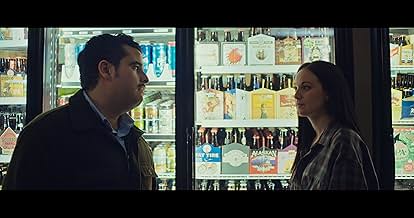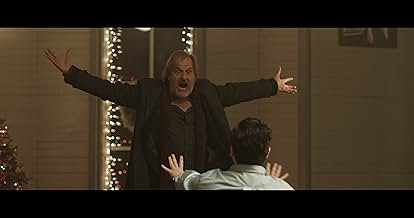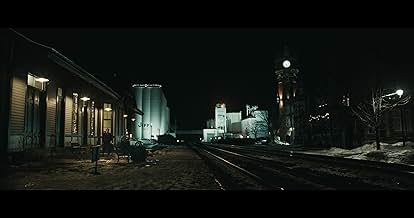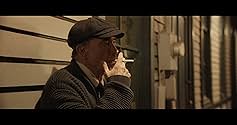Die Geschichte eines jungen Mannes, der seinem Helden Joseph von Angesicht zu Angesicht gegenübersteht und die verworrene Beziehung zwischen den Träumen der Jugend und der Weisheit des Alter... Alles lesenDie Geschichte eines jungen Mannes, der seinem Helden Joseph von Angesicht zu Angesicht gegenübersteht und die verworrene Beziehung zwischen den Träumen der Jugend und der Weisheit des Alters erforscht.Die Geschichte eines jungen Mannes, der seinem Helden Joseph von Angesicht zu Angesicht gegenübersteht und die verworrene Beziehung zwischen den Träumen der Jugend und der Weisheit des Alters erforscht.
- Auszeichnungen
- 13 Gewinne & 15 Nominierungen insgesamt
Handlung
WUSSTEST DU SCHON:
- WissenswertesPartly filmed in Chelsea, Michigan, where Jeff Daniels grew up, and his father was the Mayor, and also owned a lumber company.
Ausgewählte Rezension
Greetings again from the darkness. "Based on an incident which became a play which became a movie." It's with this note, the film version of Jeff Daniels' 2006 play begins. Daniels also stars as (fictional) playwright Joseph Harris, who won a Pulitzer Prize, an achievement he rarely lets anyone forget. Harris' success seems to have left him tormented and blocked, as he hasn't written anything "readable" in 20 years ... a tidbit we learn from his agent (Erika Slezak, more than 2200 episodes of "One Life to Live"). The two meet for "coffee", which is literary code for early drinking ... a hobby Harris seems dedicated to during all waking hours.
That scene with Mr. Daniels and Ms. Slezak is one of the two best in the film - the other being near the end. The two long time collaborators wage a war of words - some offensively, others defensively - and the agent gives as good as she receives. When he claims to hate television, and proclaims "I'm a playwright", she counters with "You're a dinosaur." We learn much about the Joseph Harris character in this sequence. While it's easy to label him a burnout, we sense there is something deeper that has him dreading the trip from New York City to Michigan to fulfill a contractual obligation with a local theater group.
Once Harris arrives in small town Michigan, the vast majority of the rest of the film is shot inside the quaint train depot ... a station that most of the passing trains don't even slow down for. Over-eager playwright-wannabe Kenneth Waters (played by newcomer Thomas Macias) is late to meet his hero, and for that, he is subjected to mounds of verbal abuse from Harris, who can barely maintain consciousness over inebriation. Despite his love for the bottom of bottles, Harris proves always capable of a vicious diatribe directed at easy target Kenneth. However, periodically mixed in with the poison, are some words of wisdom for the young man.
The bulk of the film is a competition between Harris and Kenneth. Can the young local theater apprentice convince the washed up legend to stay in town and fulfill his theatrical duty? Adding spice to the proceedings is the train master (played by Richard McWilliams), who not only wields a wicked baseball bat, but he also sees, hears, and judges everything that happens in his station.
As part of the ongoing negotiations, Harris agrees to read the first play Kenneth has written. The young man eagerly awaits the insightful feedback from his idol, but the moment becomes a lesson in worshipping heroes ... they are just as human as us. Mr. Macias does manage to mostly hold his own in what easily could have been a one-man show, if not for Harris' need for someone at whom to direct his rants. We half expect Kenneth to mutter, "I'm your number one fan!" as he absorbs the insults and takes in the life lessons.
The backstory for this one is pretty interesting. Mr. Daniels admitted in an interview that he wrote the story based on actual events in the theater many years ago involving playwright Larnford Wilson, who might not view that as a compliment, were he still alive. This is also the first film under Grand River Productions, a joint venture of Mr. Daniels, Tim Busfield (who directs the film), and Mr. Busfield's wife, actress Melissa Gilbert ("Little House on the Prairie"). It was shot mostly in Chelsea, Michigan where Mr. Daniels lives, and where he founded his Purple Rose Theater Company. And the homegrown aspect goes even deeper. Busfield's son Wilson Coates Busfield is the DP, while Daniels' son Ben did the composing.
It seems obvious that Daniels learned some lessons on structuring dialogue from his time on "The Newsroom" with Aaron Sorkin. We hear it in such lines as "I'm a playwright. I'm eternally serious", as well as the ongoing battle between hope and cynicism. Typing out the opening credits is a nice tough for a movie featuring a writer, but the "I'm not sorry" bits are overplayed. As mentioned previously, the two best sequences are that opening in NYC, and the scene outside the depot near the end, when Harris comes clean on what he's written and why - a scene that also includes the best and most heart-breaking line in the film. It may not be "The Great American Play", but there is plenty here to take in and think about. Sorry, not sorry.
That scene with Mr. Daniels and Ms. Slezak is one of the two best in the film - the other being near the end. The two long time collaborators wage a war of words - some offensively, others defensively - and the agent gives as good as she receives. When he claims to hate television, and proclaims "I'm a playwright", she counters with "You're a dinosaur." We learn much about the Joseph Harris character in this sequence. While it's easy to label him a burnout, we sense there is something deeper that has him dreading the trip from New York City to Michigan to fulfill a contractual obligation with a local theater group.
Once Harris arrives in small town Michigan, the vast majority of the rest of the film is shot inside the quaint train depot ... a station that most of the passing trains don't even slow down for. Over-eager playwright-wannabe Kenneth Waters (played by newcomer Thomas Macias) is late to meet his hero, and for that, he is subjected to mounds of verbal abuse from Harris, who can barely maintain consciousness over inebriation. Despite his love for the bottom of bottles, Harris proves always capable of a vicious diatribe directed at easy target Kenneth. However, periodically mixed in with the poison, are some words of wisdom for the young man.
The bulk of the film is a competition between Harris and Kenneth. Can the young local theater apprentice convince the washed up legend to stay in town and fulfill his theatrical duty? Adding spice to the proceedings is the train master (played by Richard McWilliams), who not only wields a wicked baseball bat, but he also sees, hears, and judges everything that happens in his station.
As part of the ongoing negotiations, Harris agrees to read the first play Kenneth has written. The young man eagerly awaits the insightful feedback from his idol, but the moment becomes a lesson in worshipping heroes ... they are just as human as us. Mr. Macias does manage to mostly hold his own in what easily could have been a one-man show, if not for Harris' need for someone at whom to direct his rants. We half expect Kenneth to mutter, "I'm your number one fan!" as he absorbs the insults and takes in the life lessons.
The backstory for this one is pretty interesting. Mr. Daniels admitted in an interview that he wrote the story based on actual events in the theater many years ago involving playwright Larnford Wilson, who might not view that as a compliment, were he still alive. This is also the first film under Grand River Productions, a joint venture of Mr. Daniels, Tim Busfield (who directs the film), and Mr. Busfield's wife, actress Melissa Gilbert ("Little House on the Prairie"). It was shot mostly in Chelsea, Michigan where Mr. Daniels lives, and where he founded his Purple Rose Theater Company. And the homegrown aspect goes even deeper. Busfield's son Wilson Coates Busfield is the DP, while Daniels' son Ben did the composing.
It seems obvious that Daniels learned some lessons on structuring dialogue from his time on "The Newsroom" with Aaron Sorkin. We hear it in such lines as "I'm a playwright. I'm eternally serious", as well as the ongoing battle between hope and cynicism. Typing out the opening credits is a nice tough for a movie featuring a writer, but the "I'm not sorry" bits are overplayed. As mentioned previously, the two best sequences are that opening in NYC, and the scene outside the depot near the end, when Harris comes clean on what he's written and why - a scene that also includes the best and most heart-breaking line in the film. It may not be "The Great American Play", but there is plenty here to take in and think about. Sorry, not sorry.
- ferguson-6
- 19. Juli 2020
- Permalink
Top-Auswahl
Melde dich zum Bewerten an und greife auf die Watchlist für personalisierte Empfehlungen zu.
- How long is Guest Artist?Powered by Alexa
Details
Box Office
- Bruttoertrag in den USA und Kanada
- 10.017 $
- Eröffnungswochenende in den USA und in Kanada
- 944 $
- 12. Juli 2020
- Weltweiter Bruttoertrag
- 10.017 $
- Laufzeit1 Stunde 14 Minuten
- Seitenverhältnis
- 2.35 : 1
Zu dieser Seite beitragen
Bearbeitung vorschlagen oder fehlenden Inhalt hinzufügen


























